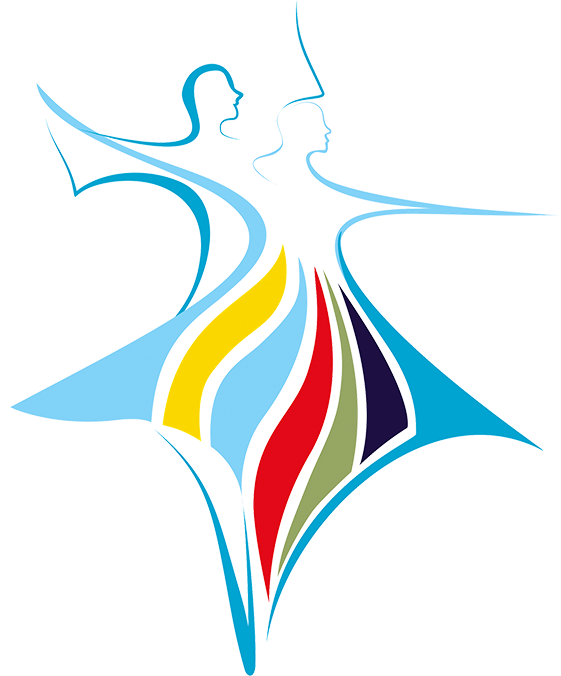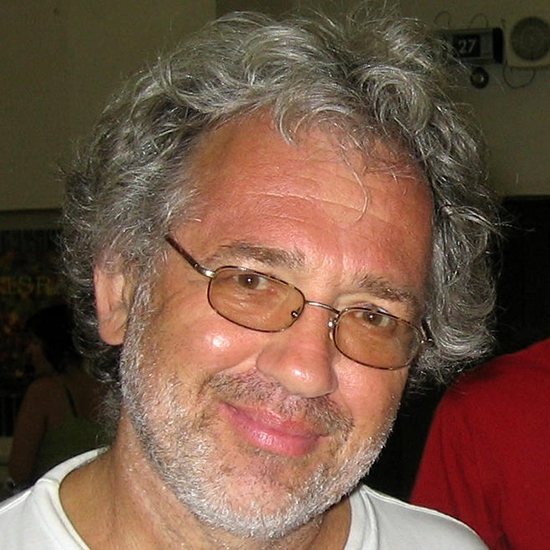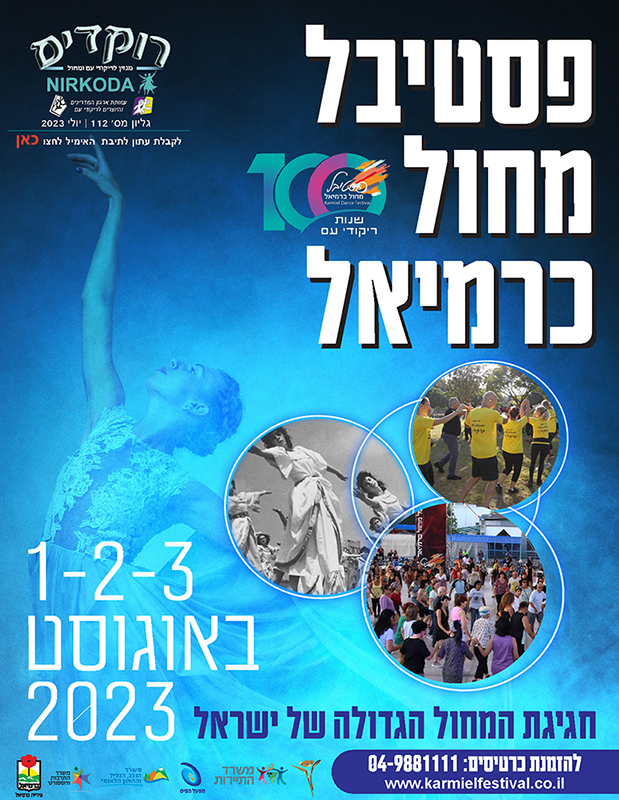- Home
- Rokdim Nirkoda 112
- Israeli Folk Dancing in Australia (Part II)
Israeli Folk Dancing in Australia (Part II)
On the development of folk dance at the various dance clubs in Australia
In our last edition of Rokdim-Nirkoda, issue #111, we covered the Israeli folk dance scene in Melbourne, certainly one of the largest dance communities in a single city outside of Israel. In Part 2, we are now including Sydney, Perth and Tasmania. We are aware that Australia offers even more dance classes in places such as Brisbane (Queensland), Canberra, and even in Darwin, the capital of Australia’s Northern Territory.
Frances Fester – Sydney
http://www.israelidancingsydney.com.au/
E-mail: frances@israelidancingsydney.com.au
Frances Fester started to dance back in 1987. As she told me, it must have been “love at first sight”. From the first moment, she was eager to learn as many dances as quickly as possible. Waiting a whole week for the next sessions often became a hard task. The class she attended was founded in the early 1980s by some Israeli expatriates, whose primary goal was to create a kind of Hebrew atmosphere through speaking the language, listening to their favorite music from back home, and certainly, also doing some dancing. They named their non-profit group, “Ha-Moadon” (= The Club). The lady in charge was an experienced folk dance teacher who, after several years, had to give up her voluntary work as a “markida” (Israeli folk dance teacher) due to her obligations with a full-time job.
At this stage, since Frances was on maternity leave because of her young children, she was able to accept the request of the club’s organizers to help out here and there. After all, she already had a certain knowledge of Israeli folk dances and had even gained experience at a Jewish school through teaching dances to Israeli music with simplified step sequences.
Finally, by the end of 1991, Frances was the only one left teaching Israeli folk dancing in Sydney, which has been the case over the following decades until the present day.
Around this time, she also met her second husband, Sami Busqila, who regularly used to attend the dance sessions she now started to lead on her own, that was then still under the umbrella of “Ha-Moadon”. They married in 1992 and since then she could not have developed her weekly sessions without Sami, who grew up in Northern Israel and danced since his childhood, namely with Menachem Menachem. Like Sami. Frances also had no professional training as a dance teacher. However, having already been a primary school teacher in combination with the knowledge gained from several years of Israeli folk dancing, after about a decade, she quickly felt comfortable enough to independently take over the IFD [Israeli Folk Dance] section in Sydney.
Besides the regular evening sessions, for some twenty years, Frances also taught Israeli folk dances at her children’s school. Together with a teacher colleague, she once assembled sixty kids for an Israel Independence Day performance, while the kids’ parents created the costumes. Organizing performances with adult groups turned out to be much more difficult, as she was never supported by the Jewish Community of Sydney, which – as it seems – does not seem to care about any Israeli folk dancing.
It was important for Francis to lead a dance session throughout the entire evening. This meant being prepared for practically all dances which were put on. Thirty years ago this implied preparing the cassettes at home. To keep being up-to-date (and even before becoming a teacher) she had acquired the dance material provided by Yaron Meishar since the early 1980s, such as audio and video cassettes. Thus she also acquired a great knowledge of Hebrew-Israeli dance terminology. She attaches importance to presenting a broad range of dances, beginning with the pioneer dances onward to the 1980s and 1990s up to the so-called “latest hits”.
However, Frances has never been in a rush to be as updated as possible since she did not want to lose the older dances that the group loved. Therefore, sometimes she looked kind of slow in moving ahead. The plus side of this is that the group in Sydney accumulated an amazing repertoire of dances from every decade. When visiting Israel and dancing there, it seemed that they did the very new dances in the Israeli sessions, some very old dances but not much of those dances that had been introduced about five to ten years ago. “In Sydney, we do them all”.
Today’s average age of Frances’ groups is around sixty years and the socializing outside of her dance events seems to have stopped. From around twenty-five until thirty years ago, this was quite different: Not only did the dancers often meet after the dance sessions, but they also organized their own non-dance-related activities. Young Israelis, travelling after their military service in South East Asia, frequently extended their stay abroad, also in Sydney, and frequently came to her classes. This seemed to have stopped; during recent years Israelis hardly showed up anymore. The younger members of the local Jewish community do not seem to show any interest in Israeli folk dances. This is also true for the local Zionist organizations where Frances had offered to introduce some dances more than once. Up to the COVID-19 limitations, she conducted four weekly classes, two in the evening and two daytime classes. Luckily, after three years she was able to return to her pre-COVID-19 schedule.
Frances concluded her story with the sentiment that Israeli folk dancing is still her passion. The music as well as the steps will always fill her heart.
Hora Shalom – Perth
E-mail: horashalomperth@gmail.com
jcohen@westnet.com.au; madglen@iinet.net.au
Sara Friedman arrived in Perth, the capital of Western Australia, from Israel around 1975 and actually taught Israeli folk dances for many years at “Perth International Dance”. In 1973, she participated in a course for folk dance instructors (“Ulpan”) in Haifa. Her teachers were, among a few others, Yonatan Gabay, Tamar Alyagor, Bentzi Tiram, Yankele Levy, and Tirza Hodes. Dancing in European cities, mainly in Amsterdam, inspired her to start an independent group that did Israeli dances regularly. In 1995, she decided together with a friend named Racheli, to found a separate group in Perth that specialized in Israeli folk dancing and named it “Hora Shalom”. They had a humble start with seven dancers. However, after only about half a year, the number of regular participants rose to over twenty-five people and they decided to open a second class. The group expanded again in 1998 when Jenni Cohen (now Rosenberg) started a beginners’ class.
Today, “Hora Shalom” has close to ninety dancers who pay an annual subscription fee of A$ 20 (= US $13.50 or ILS 46). The age range is between twenty-three and eighty-five, with the majority being in their sixties or seventies; however, there also is a fairly large group of dancers who are already over eighty years old. Most of the dancers there are women. Nowadays, after the COVID-19 period, they are back to three classes a week, with the number of participants in the sessions ranging from ten to forty.
There are six permanent teachers, supported by two guest teachers. The teachers come from a wide variety of professional backgrounds, some of them actually work as teachers in other professions such as Peter Fallon who actually specializes in international folk dances. Jenny Shah and Margaret Glenister, the older teachers, had attended workshops in Australia and around the world. Jenny also participated in the course for instructors from abroad at the Karmiel Festival. Jan Kaye and Jenni Rosenberg also participated in workshops in Australia and Europe.
Michiko Gough from Japan had taught primarily partner dances but currently lives in Tasmania. Another teacher who joined recently, Justine Berg, now is the youngest of the instructional group. Here and there the teachers are joined by Karen from the Hora Maccabi team. In general, almost all teachers started as dancers, who, over the years, fell in love with IFD and then, at a certain stage, started teaching. Little by little they diligently trained themselves.
The group here receives no financial support from the outside; everything is financed by the dancers. Occasionally however, since the group is not a commercial business but a community organization, they receive scholarships for certain projects such as weekend workshops with teachers and dance instructors from Israel and other countries. The price for a session is A$ 10 (= US $6.70 or ILS 23). Each session lasts about two hours. Normally, during the first hour, dances are newly taught or quickly reviewed, while the second hour is reserved for dancing without demonstrations. When Sara Friedman started the group, she concentrated on the well-known basic dances that she calls, “classical dances”. With the common access to the internet by everyone, sometimes she may ask her dancers to look up a specific dance, but certainly, newer dances are still being taught as well.
Sara meanwhile retired from the management of “Hora Shalom” but continues teaching, especially the material from the 1970s to the 1990s, in order to keep some of the dances from this period alive. The group established a committee that meets every few months to discuss the day-to-day activities. Twice a year, they organize a course for beginners, “From the First Step”, that meets once a week during a six-week period and who are then ready to join the regular classes. In addition, they organize two or three so-called “marathons” a year where music is simply played non-stop for four hours, commencing with the basics and gradually advancing to slightly more complicated dances.
There are several other smaller groups in Perth, but there is no competition, as Sara points out. They all come to dance, everyone at his own level and with his personal love for dancing: “No tests, no medals”. During the COVID-19 period, instructors from abroad could not have been invited. As a result, they organized a one-day workshop called, “Rikud Perth,” in which all groups from Perth participated. Each group taught two of their favourite dances. Over eighty dancers participated in this workshop.
Hora Shalom is a group whose members are not Jewish. Sara’s idea was to introduce Israeli folk dances to the general population. After thirty years of being involved in IFD, for her, it is still a mystery as to what precisely attracts people in faraway Australia to such a thing. These are people who are not Israeli, who are not Jewish, who have no cultural connection to Israel and, last but not least, who do not understand the [Hebrew] language. Perhaps it is the wish to express in a peaceful environment some kind of prayer and hope for a better time and an even better world; the meeting between new and old, East and West, which relates to people who come from all corners of the world and completely different lifestyles and backgrounds.
It was very important for Sara to mention the “Rokdim” website which the group uses regularly. They are happy to support his [Yaron Meishar’s] life’s work over the years. Who knows what will happen to IFD in the future? Already back in 1973, when Sara participated in the instructors’ course (Ulpan), some were already prophesying the end of Israeli folk dancing. And today? Fifty years later, all over the world, thousands of people are still dancing IFD. Above all, in distant Perth, “Hora Shalom” shows no signs of dying. They continue to dance, week after week, and there is a certain nucleus that is almost “addicted to it”.
Hora Maccabi – Perth
https://maccabi.com.au/blog/mac_clubs/wa-israeli-dancing
E-mail: ruthtopelberg@gmail.com
Hora Maccabi started in Perth in 1994. The original organizer was an Israeli “community shaliach”, Eytan Pe’er, who accomplished gathering quite a large group of people around him who were keen to learn Israeli dances. Those initial Wednesday night classes are still going. From the inception of the Club, Ruth Topelberg has been the President together with their Treasurer who is also long-serving. Maccabi Western Australia encouraged them to be part of their organization and this has worked very well.
The dance sessions take place in a Maccabi Hall on the Maccabi grounds, which is also the location of the community Jewish Day School, Home for the Aged and Menora Jewish Charity.
At the moment they have four weekly sessions: Monday mornings (for the young at heart), Monday evenings (a beginners’ plus class), Wednesday evenings (advanced) and Friday mornings (general).
The club’s teachers are very keen to bring the latest dances from around the world, combined with beautiful music and innovative steps, to Western Australia. Caren Lipinski, Claudia Hart, and Jan Kaye have been teaching for several years; Claudia has been the longest, for over twenty-five years.
The participants’ average age is not as young as it used to had been but, “Hora Maccabi” does try to bring in new, especially younger, dancers. Occasionally they introduce a new beginners’ course. Their basic philosophy is to fill the dancers’ “hearts with joy, treasuring the friendships and camaraderie” that, in the end, their dance classes provide. In “up-side-down spring” (September/November) they organized an “Open Day” for anyone interested to try Israeli dancing. They considered this a fantastic success: there were nearly fifty people who attended, including some of the regular dancers.
Hora Tasmania – Hobart
E-mail: michiko.gough@gmail.com
Hora Tasmania was founded by Michiko Gough in 2014. She was born in Japan and started dancing in her early twenties at an international dance group under the leadership of Satoru Suganuma. Since the group especially loved Israeli folk dances, about half of the time of each dance session was reserved for them. Once a week, Michiko also went to the Tokyo Jewish Center for dancing. Soon, she also started studying some Hebrew in order to understand the lyrics to the tunes of the songs she was dancing to as well as their background.
In 1998 she moved to Perth and joined the local “Hora Shalom” where she had already engaged in some teaching. However, fifteen years later, in 2013, Michiko moved to Glenorchy, a suburb of Hobart, the capital of Tasmania. Because there was no Israeli folk dancing in Tasmania, she decided to found her own group, “Hora Tasmania,” which she named in honour of her late dance partner, Naftali Duvdevani.
The regular classes, in cooperation with “Dance Folk Tasmania”, take place in another suburb of Hobart, Moonah, for about two hours once a week; the fee is A$ 5 (= US $3.40 or ILS 11.50). About eight to twelve dancers, aged in their fifties to eighties, attend. Sara Friedman, the founder of Hora Shalom in Western Australia, supported this group when visiting Hora Tasmania in 2015 and 2017. Another dance teacher at Hora Shalom, Jenni Rosenberg and her mother, Ruth Cohen, visited the group in February 2023 and Jenni brought some new dances with her. They are also happy to again welcome Sara Friedman from Perth this coming November to give especially the beginners’ class another boost.
Michiko attended the teachers’ course for IFD in Karmiel in 2005, 2008, and 2012. Without Satoru’s charisma, she would have never come to Israeli dancing and eventually start to teach Israeli dancing in Australia.









Comments
התראות